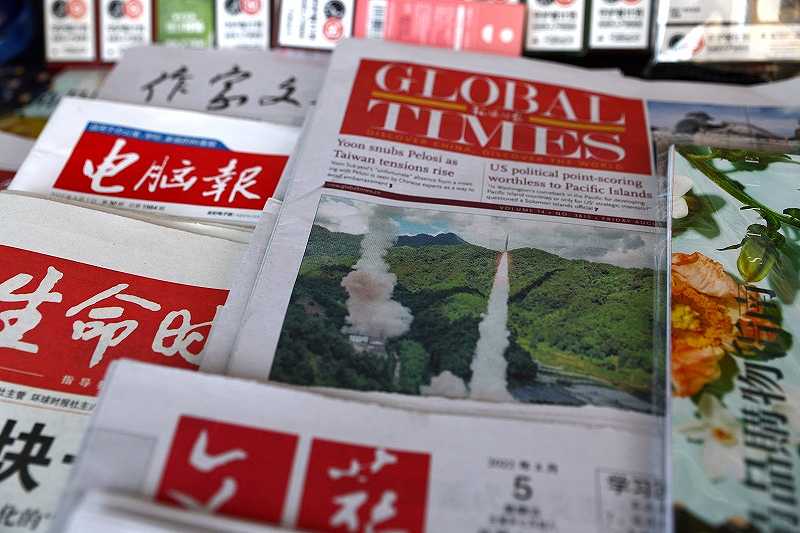
A picture of the Rocket Force under the Eastern Theatre Command of China’s People’s Liberation Army (PLA) conducting conventional missile tests into the waters off the eastern coast of Taiwan, is seen on a newspaper front-page, at a newsstand in Beijing, August 5, 2022.
20:00 JST, October 6, 2022
China’s military conducted one of the largest drills in its history in August as a rebuke to U.S. Speaker of the House Nancy Pelosi’s visit to Taiwan. In the midst of these drills on the seas, in the air and on the land around Taiwan, China’s military was also steadily conducting special exercises that went unnoticed by most people.
While Taipei serves as a physical front line for tensions between Washington and Beijing, China continues to foment situations favorable to itself through methods to manipulate and disrupt the minds of Taiwan residents.
On Aug. 5, the second day of the drills, the official People’s Liberation Army Daily newspaper circulated a photo on social media showing a person on a Chinese naval vessel monitoring what was purportedly a Taiwan naval vessel in waters supposedly close to Taiwan. The photo was also circulated to media around the world to depict the tense situation surrounding the drills.
Taiwan’s Defense Ministry, which was monitoring every Chinese vessels’ movement, concluded that the image was faked because of the unnatural nature of the composition, including the excessive proximity to land.
On the night of Aug. 2, when Pelosi arrived in Taiwan, the Xinhua News Agency was among the outlets in China reporting that Sukhoi Su-35 fighter jets crossed the Taiwan Strait, which Taiwan’s Defense Ministry also denied.
Furthermore, the Chinese military claimed that, with the ballistic missiles it launched that fell into waters off the eastern coast of Taiwan, it had demonstrated precision missile firing right in front of the USS Ronald Reagan deployed in the western Pacific Ocean, causing the U.S. nuclear-powered aircraft carrier to retreat “hundreds of kilometers.” According to sources involved in Japan-U.S. relations, the warship was merely navigating on a separate mission.
One of the sources said that these Chinese activities are part of its cognitive warfare, “aiming to make Taiwan and allies of the U.S. believe that the U.S. military can’t help in the defense of Taiwan.”
Beijing is believed to be imitating the Kremlin’s example ahead of Russia’s annexation of Crimea in southern Ukraine in 2014, when it gained the upper hand through an information war on social media.
From Aug. 1 to 8, Taiwan’s Defense Ministry confirmed 272 cases of false information from China. The private Taiwan FactCheck Center independently identified about 30 cases of false information.
“Some of the false information is so cleverly crafted that it cannot be determined whether it’s real or fake, even after several days of analysis,” said the center’s editor-in-chief, Chen Hui-min. “Fact-checking becomes even more important when you’re impatient, nervous or angry.”
Japan is not immune to this situation, as the Taiwan contingency is closely related to the nation’s own security.
Pro-Beijing influencers
China wages cognitive warfare in Taiwan even when tensions are not high. China uses Facebook and other U.S. social media platforms to spread false information to demonize Taipei and garner support for Beijing. Activities to cultivate pro-China influencers also exist.
In October last year, a 37-year-old man from Hualien County in eastern Taiwan was sentenced to three months in prison for spreading a hoax regarding the COVID-19 pandemic on Facebook. The man had claimed that the Taiwan authorities refused to disclose 500 deaths. What surprised Taiwan society was not so much the content of the claim but the hidden connection between the man and China.
According to Taiwan’s Justice Ministry, the man and his 35-year-old wife, who is from mainland China, participated in a training session for four days in China’s Jiangxi Province in the summer of 2019. The session was organized by the Communist Youth League of China, a Chinese Communist Party organization.
The training consisted of how to manipulate public opinion using the internet to draw attention and spread ideas.
The man had previously created a Facebook group advocating the unification of China and Taiwan and began spreading false information regarding the pandemic after the training session. The man had more than 10,000 followers.
When the man was asked by the investigators about his motives, he said only, “I did it because it was fun.”
The Chinese Communist Party has emphasized so-called United Front Work to bring forces outside the party to its side. Taiwan is its most important target. Previously, it had emphasized dividing Taiwan through politicians and political parties, but it has shifted its focus to reaching out to the youth in Taiwan.
On YouTube, there have recently been a number of videos posted by young people in Taiwan belittling Taiwan and praising China. False information transmitted by young people in Taiwan can become accepted as the truth and spread much more easily.
Taiwan cybersecurity firm TeamT5 published a report in October 2020 saying that China is using social media as a weapon to legitimize itself and increase its political influence. The report added that this is a serious challenge for a democratic nation.
In recent years, China’s diplomats in Western countries have actively made use of social media. Any number of people can register for an account and spread China’s claims. In Hong Kong in 2019 during the mass protests against Beijing, protesters were vilified on social media. During the pandemic, information praising China’s measures against the virus have also been disseminated.
U.S. social media companies have responded to suspected Chinese manipulation of public opinion by shutting down accounts. Last December, Twitter announced the closure of more than 2,000 accounts that supported China’s claims on the Uighur issue. But even when accounts are closed, new ones are created.
China’s strong intention to influence public opinion has never been more evident.
Top Articles in Politics
-

Japan PM Takaichi’s Cabinet Resigns en Masse
-

Sanae Takaichi Elected Prime Minister of Japan; Keeps All Cabinet Appointees from Previous Term
-

Japan’s Govt to Submit Road Map for Growth Strategy in March, PM Takaichi to Announce in Upcoming Policy Speech
-

LDP Wins Historic Landslide Victory
-

LDP Wins Landslide Victory, Secures Single-party Majority; Ruling Coalition with JIP Poised to Secure Over 300 seats (UPDATE 1)
JN ACCESS RANKING
-

Japan PM Takaichi’s Cabinet Resigns en Masse
-

Japan Institute to Use Domestic Commercial Optical Lattice Clock to Set Japan Standard Time
-

Israeli Ambassador to Japan Speaks about Japan’s Role in the Reconstruction of Gaza
-

Man Infected with Measles Reportedly Dined at Restaurant in Tokyo Station
-

Videos Plagiarized, Reposted with False Subtitles Claiming ‘Ryukyu Belongs to China’; Anti-China False Information Also Posted in Japan






















